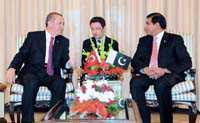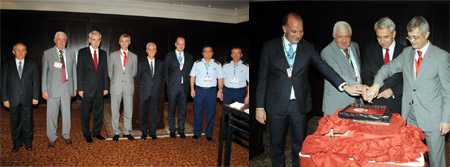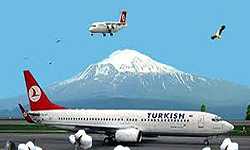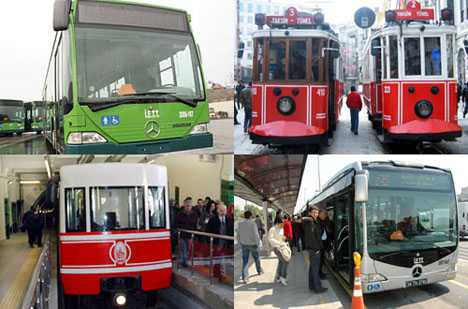ISLAMABAD, Nov 21 (APP): Prime Minister of Turkey Recep Tayyip Erdogan Wednesday said that if the issue of Karkey Power Plant was not resolved then it may have negative impact on Turkish investors who are keen to invest in Pakistan. The Turkish Prime Minister who arrived here straight from the airport to attend the D 8 Summit held one on one meeting with Prime Minister Raja Pervez Ashraf and raised the issue when both the leaders led their respective delegations at the delegations level meeting.
 Reiterating concern of Turkish government on Karkey issue, the Prime Minister of Turkey said while understanding the legal complications that are inherent in litigations, he hoped that the executive will find a way to resolve this matter.
Reiterating concern of Turkish government on Karkey issue, the Prime Minister of Turkey said while understanding the legal complications that are inherent in litigations, he hoped that the executive will find a way to resolve this matter.
Failure to do so, he said would have negative impact for Turkish investors in Pakistan.
He expressed his special concern as the ship had been mounted with state of the art devices which are likely to be damaged with the passage of time.
He said that Turkish investors were keen to invest on BOT basis for construction of dams in Pakistan. Turkish companies were only second to China in respect of construction of dams, he added.
Mr.Erdogan said that Pakistan was blessed with huge water resources which needed investment for harnessing it to meet its energy and water requirements.Turkish companies were ready to help Pakistan in this connection, he affirmed.
Prime Minister Raja Pervez Ashraf thanked his Turkish counterpart for his participation in the D-8 Summit .Terming the D-8 event very important conference he expressed the hope that the outcome of the summit will lead to more economic cooperation among the member states and better relations.
Prime Minister Ashraf said that the trade between Pakistan and Turkey is not commensurate with the ties between the two countries.
Commenting on the present volume of trade, the Prime Minister hoped that the Turkish side would have a favourable look at the tariff structure for further improving volume of trade between the two countries.
The Prime Minister said that Pakistan supports the stand taken by the Turkish government on the issue of Palestine and also referred to his telephonic conversation with Egyptian President recently, on this issue.
He lamented the loss of innocent Palestinian lives in Gaza and said that Pakistan has a principled position on Palestine. On this issue, Pakistan and Turkey were on the same page, he added.
Prime Minister Raja Pervez Ashraf apprised his Turkish counterpart of the efforts of Pakistan government to improve its relations with Afghanistan and counter terrorism.
He said that highest priority was being given to eliminate terrorism from the country.
Dilating on the issue of Afghanistan, the Prime Minister referred to recent visit of Mr.Salahuddin Rabbani, Chairman High Peace Council and termed the present nature of relationship with Afghanistan encouraging.
He said Pakistan was looking forward to trilateral summit in Ankara next month.
Referring to the Syrian situation, he termed it as having serious implications for the region and regretted that it has allowed terrorists and Al Qaeda to infiltrate in Syria.
The Turkish Prime Minister condemned the attack on Malala Yousafzai and said Turkey would be very happy if nomination of Malala for Nobel peace prize is accepted.
The Prime Minister of Turkey referred to his last visit on May 22 where substantive progress had been made between the two countries. He also called for evaluation and examination of the decisions between the two sides, then…
The Turkish Prime Minister thanked the Government of Pakistan for rescuing Turkish workers during the recent floods, who were working in Balochistan for construction of housing units. He informed his Pakistani counterpart that 4120 housing units would be delivered to Pakistan very soon.
The Turkish Prime Minister said that Turkey had been keenly following developments in Pakistan. He also announced 65 Scholarships for Pakistani students in Turkish universities.
Prime Minister Ashraf thanked him for the offer and said that the youths who would benefit from it would be the real ambassadors between the two countries.
The Turkish Prime Minister condemned the relentless attack by Israel on Palestinians and also referred to the situation in Syria.
The Pakistani side which was led by Prime Minister Raja Pervez Ashraf was assisted by Minister of Defence Syed Naveed Qamar, Minister of Water and Power, Ch.Ahmed Mukhtar, Minister of Information, Qamar Zaman Kaira and Minister of State for Foreign Affairs, Malik Amad Khan besides senior officials.
The Turkish side was led by Mr Recep Tayyip Erdogan, Dr.Ahmed Davetoglu, Foreign Minister, Vice Chairman of the ruling AK Party, senior parliamentarians of Turkey and officials assist the Prime Minister.
via Associated Press Of Pakistan ( Pakistan’s Premier NEWS Agency ) – Turkey offers to help Pakistan construct dams.





